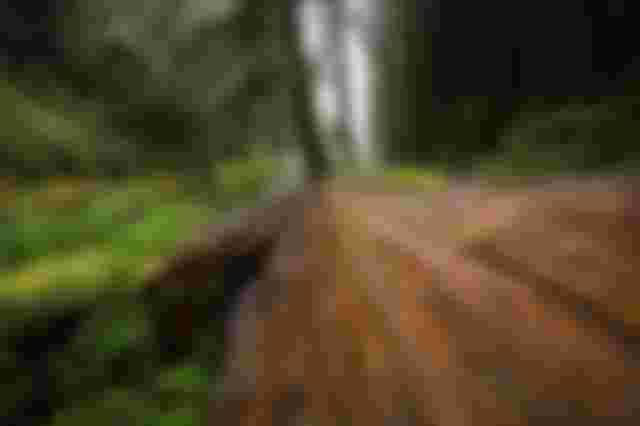This post, written at 1:30 am, is not intended to be serious. I do not want to push anything onto you, dear reader, but merely want to invite you to walk this short analytical journey with me, and try this way of thinking on. See what you think, and feel free to argue with me in the comments!
This topic raises more questions than gives answers. Several philosophies, namely Buddism, Hinduism and Taoism base themselves on the idea of internal unity of the world and the observer. This is one of the famous Buddhist riddles:
"If a tree falls in the forest and no-one is there to hear it fall, did it really fall?"

This short sentence encapsulates one of the key issues of our daily existence - the existence of a percieved border between 'inside', that is to say the person's own thoughts, and 'outside', the outside world. To some extent, the riddle implies, the world is not really there unless someone is witnessing it. The object observed is nothing without the observer. In a way, there is a common motif between this notion - the relationship betweeen the object and observer - and the peculiar philosophy of solipcism, which states that the only real thing, object or being in this Universe is you, the Observer, and the rest - well, it's no more real than a fever dream. The problem with this approach lies in the difference between 'knowing' and 'percieving'.

If you have spent a significant portion of your life on the surface of the Earth, observing the sky, then you have learnt that the Sun invariably, without fault, rises up every morning and sets every evening. So if you were to, then, live underground for some amount of time, though you would not actively percieve the Sun rising and setting, you would still be fairly certain that it does so, you'd know that it does. Therefore, from this point of view, the answer to the riddle above is yes! Anyone reasonbly aquainted with the laws of physics would confirm that indeed, objects tend to move downwards if they are not fixed in their position or held by someone. But an interesting thing occurs when we look at this riddle from the following angle. In the 20th century one of the scientific movements was of the opinion, that every observation is only certain until there is no proof to the contrary. In our example with the Sun, though we observe it rise and set every day, we cannot ever be fully certain that this is what it does. We can infinitely approach the state of absolute certainty much like the asymptote approaches one of the axis, yet never be fully certain, because for that we would have to stage repeated experiments until the end of time. Therefore, it is enough for the Sun to not rise and to not set in some distant future that we are not there to witness for our theory to be false. Following this line of argument, to say that "when a tree falls, there is always a sound" might be true as working hypothesis, but not a true statement.

But now, having prove the fact that, although we are reasonably certain that a tree makes a sound when it falls, it may not always be the case, the problem of an observer remains. After all, it is all the same if a tree falls with a sound or without a sound to this riddle. It focuses on whether there has to be an observer for the tree to fall, which is why we have to enter a different dimension for a moment.

Have you ever felt peculiar saying "I"? Like when someone asks you 'who is going to the shops?', and you say 'I am'. The pronoun "I" seems to be very straightforward at first - I is me, I is the speaker. However, if you think about it, "I" is a replacement for a name. Not just a replacement, in fact, it is a name that English attributes to the speaker. All of us separately, are called "I" when the first-person perspective is assumed. So "I" is not just you, the Speaker. It is a symbol of the person that is speaking, it represents the person without naming the person outright. This example demonstrates a much broader relationship between words and objects. If someone points at the water, and asks "What is this?", and you say "Water", this is not correct. Water is not the word "Water", it is a sound. Hence, if you wanted to properly describe water, you'd have to say something like "blupblupblup blblblblblblb blup". Much like the water, the tree falling is also a sound. Its "krkrkrkrkrkrkrkrkrKRAK........BUFFSH". So the question really is, does there have to be an observer for sound to take place? Now THAT can be explained in a much more straightforward manner. A sound is a wave, it is a rapid alternation of sound and silence, and for a sound to happen, there has to be something that recieves the sound, something that the sound could bounce off of. That could be our eardrums, another tree or any other surface. So in this sense, the question really boils down to whether humans (because presumably the observer is human, or an animal at the very least) are the only beings that can receive sound and therefore understand what is meant when someone says to you "the tree fell".

This could go both ways: you can say, well, the sound has to be percieved and interpreted, not just percieved, and the only natural thing that can percieve sound is a brain. So then you'd say "No, the tree didn't fall if there was no sound registered". Alternatively, you could probably argue that human hearing is not all that central: after all, if a deaf person would watch the tree falling, they would still be able to verify that it fell, even though they do not hear the sound of it falling. Furthermore, you could say that as long as there was something for the sound to bounce off of, it's fine, the tree fell. But what is the big deal with the tree and the sound and the falling anyway?
Well, you see, we have stumbled onto an interesting discovery: if a human, or even human hearing is not central to the tree falling, then could it be fairly said that the observer and the tree are one? After all, the sound of a falling tree may take place regardless of whether the observer is there or not. Only when humans were not located within the system with the falling tree it would be true to say that the falling of the tree depends on a human being present. But it isn't! The tree will fall regardless, because its roots are weak, or because it has rotten or something. We are not key to it being able to fall.

This notion, the notion of us living within, not outside of the system that we call the Universe, has another very simple example to support it. Thoughts. If a tree falls, won't you think something to the extent of "Gosh, I hope it won't hit me! I should probably stop and make sure I'm not in any danger!". Any extrenal, and even internal stimuli produces a mental reaction in us. The thought does not happen independently, it is caused by something, an event or even another thought. Therefore, just like we change the world around us, in other words, cause it to react to us, we react to it by thinking! This is the secret of unity between us and the Universe.
So, as a wonderful man has put it once, "now there is nothing left for you to do, but to have a good laugh!"
You are a part of this world. You are not a stranger here, not something that is here on probation, not something that has arrived here by fluke. Your existence is absolutely fundamental, and deep deep down, far far in, you are simply the basis and nature of existence itself, only you might not realise it.
Inspired by the works and lecture of Alan Watts
Sources
Fotos:
https://blog.oup.com/2011/02/quantum/
https://www.kompoz.com/music/collaboration/822379/seps;jsessionid=443B750B292DFBCAF33B64D629DC3D93
https://www.meandme.com/?lang=en
https://www.hearinglink.org/your-hearing/causes-hearing-loss/
https://en.wikipedia.org/wiki/Relativity_(M._C._Escher)
Cover image:






I think I get the idea... Our thoughts are just conditioning us. We forgot that LIFE is just what we are, not what it passes by...